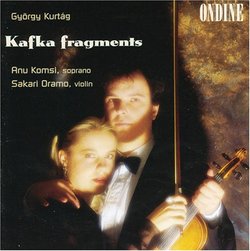| All Artists: Gyorgy Kurtag, Anu Komsi Title: György Kurtág: Kafka Fragments Members Wishing: 0 Total Copies: 0 Label: Ondine Release Date: 10/15/1996 Genres: Special Interest, Classical Styles: Chamber Music, Historical Periods, Classical (c.1770-1830) Number of Discs: 1 SwapaCD Credits: 1 UPC: 761195086827 |
Search - Gyorgy Kurtag, Anu Komsi :: György Kurtág: Kafka Fragments
 | Gyorgy Kurtag, Anu Komsi György Kurtág: Kafka Fragments Genres: Special Interest, Classical
|
Larger Image |
CD Details |
CD ReviewsOne of the great works of the century. Karl Henzy | 01/06/1999 (5 out of 5 stars) "What the Grammaphone guy fails to just say straight out: this is one of the most gut-renching, riveting song-cycles of the century (the performance, which sounds great to me, is certainly good enough for the music to come through). Kurtag is always at his best with texts rather than in purely instrumental works. In Kafka's diary entries and aphorisms from his letters he seems to have found the perfect match in sensibility. Many of the songs are less than a minute, but in that time the violin and voice suggest a whole universe of visceral experience. Kurtag belongs in the same company as Carter and Lutoslawski (i.e., in the very highest level)." 40 miniatures, an absurd fragmented slice of life R. Hutchinson | a world ruled by fossil fuels and fossil minds | 06/02/2005 (5 out of 5 stars) "KAFKA FRAGMENTS is 40 very short pieces for soprano and violin -- here performed by the young Finns Anu Komsi and Sakari Oramo. (Dawn Upshaw sang it in January of 2005 in NYC, Geoff Nuttall on violin, in a dramatic performance, doing housework, with black-and-white photo projections.) I find it strangely compelling, even though avant vocal music is not my favorite variety -- I love Schoenberg's PIERROT LUNAIRE, but I can't take ERWARTUNG. I can't understand how some perceive this music to be "gutwrenching" or "heartrending" -- it's atonal, it doesn't summon up that kind of emotion, not for me. It's about alienation and estrangement. Here are some sample lyrics (it's sung in German, but the booklet provides English translations): "Slept, woke, slept, woke, miserable life" "The true path goes by way of a rope that is suspended not high up, but rather just above the ground. Its purpose seems to be more to make one stumble than to be walked on." "There is a destination, but no path to it; what we call a path is hesitation." "The moonlit night dazzled us. Birds shrieked in the trees. There was a rush of wind in the fields. We crawled through the dust, a pair of snakes." Musically, the closest parallel clearly seems to be PIERROT LUNAIRE, though Kurtag's single biggest musical influence is Webern. The lyrics remind me very much of Beckett, whose writing I'm more familiar with than that of Kafka (don't miss WAITING FOR GODOT or the great trilogy MALLOY/MALONE DIES/THE UNNAMABLE). What's the difference between Kafkaesque and Beckettian, I wonder? Kurtag is well-known for saying his music is made out of almost nothing. KAFKA FRAGMENTS is certainly a case in point -- just a voice and a violin above the abyss, a few essential things, conveying much with little. An incredible creation, powerful existentialism: "On the stock of Balzac's walking-stick: 'I surmount all obstacles.' On mine: 'All obstacles surmount me.' They have that 'all' in common."" Kurtág's masterpiece, so far... Music Fan | 11/18/2009 (5 out of 5 stars) "Kurtág's specialty is the human voice accompanied by small mixed instrumental ensembles. Kafka Fragments reduces this formula to the elemental, but original, combination of the soprano voice with a single violin. But the violin writing is far from simple, filled with multiple stops, pizzicati, and microtonal swervings, and the voice whispers, speaks, and screams as well as sings.
On the basis of this description alone, this music may scare listeners off and that would be a terrible pity. To an open mind (and an open ear), this music is engaging, startling, moving, and occasionally - believe it or not - quite funny. Kurtág's selection of texts accounts for a good deal of the music's appeal. Kafka's notebooks are filled with aphorisms and observations that virtually cry out to be set to modern music. One piece reads (in German) in its entirety: "From a certain point, there is no going back. That is the point to reach." Another: "In the struggle between yourself and the world, side with the world." Others describe characters, activities, or brief scenes. The music that accompanies it sometimes illustrates the text, other times mocks it. Sometimes it is frankly beautiful, sometimes piercing. The recurrence of a motto theme often transformed and in musically or emotionally unfamiliar contexts helps to unify the piece and guide the listener. Making an attempt to follow the texts, presented in the original German with translation, while listening makes a huge difference. Yes, this is modern music. Some even might consider it avant-garde. But unlike many other modern or contemporary composers, Kurtág hasn't given up on traditional musical devices that work, like melody, repetition, dance rhythms, and so forth. His Bartókian lineage, particularly the interest in folk music, is often audible, but he always sounds like his own man. Some might hear in this music the continuation of the expressionist tradition of Webern, Berg and Schoenberg. Or perhaps the grating vanguardism of a Boulez or Carter. But to my ear, this is music that doesn't require a degree in musicology, or a black turtleneck sweater, to enjoy. This is music that will last. " |

 Track Listings (40) - Disc #1
Track Listings (40) - Disc #1